Can Turmeric Prevent and Treat Food Poisoning?
Most Common Causes
Over 90% of food poisoning cases are caused by: (67)
- Staphylococcus aureus
- Salmonella
- C. perfringens
- Campylobacter
- Listeria
- V. parahaemolyticus
- B. cereus
- E. coli
Turmeric and its compounds have shown activity against all of these except Campylobacter jejuni. Turmeric also inhibits Anisakis simplex, a parasitic worm that can cause food poisoning and severe allergic reactions. A. simplex infections can occur from eating undercooked contaminated fish. Indirect exposure to the dead parasite (such as from eating chicken fed contaminated fish meal) can cause severe allergic reactions. (v.26, 67)

Turmeric has been used for thousands of years for its healing properties. traditional herbal medicines continue to use it to treat many illnesses, including infections. (v.62-64)
Modern research confirms turmeric's antimicrobial properties against many of the germs and bugs found in food. Results indicate that turmeric could be an effective natural remedy for food poisoning. According to some researchers, over 40 million people a year in the United States alone get sick from bacteria in food. In addition, people worldwide are infected with parasites in contaminated water and food. (v.62-64)
Outbreaks of food poisoning by some bacteria are increasing. What makes food poisoning scarier is that a growing number of these bacteria and viruses are resistant to conventional antibiotics. However, turmeric may provide an herbal solution, blocking even drug-resistant types. Some of the disease-causing microbes in food and water that turmeric and its compounds show activity against include: (v.6, 11, 16, 64-66)
- Bacillus cereus
- Bacillus subtilis
- Clostridium perfringens
- Escherichia coli
- Giardia lamblia
- Listeria
- Vibrio bacteria
Turmeric's ability to promote faster wound healing also limits the chances microbes have to cause infection. (v.26, 67)
Salmonella Safety Concerns
One study suggests people might want to avoid taking pure curcumin extracts from turmeric for salmonella. Even so, other studies show that crude extracts of turmeric are powerful and safe antibacterial compounds against salmonella strains. (v.68)
Is Turmeric Linked to Food Poisoning?
So, you may have heard reports suggesting that turmeric causes food poisoning. What's the evidence?
Bacteria and mold can be found in some contaminated spices and herbs, depending on conditions where they are sold from. And there have been rare reports of outbreaks of food poisoning linked to cooked foods prepared with turmeric. (v.243-247)
Most of the reports don't indicate that turmeric promotes bacteria that cause food poisoning. One study did conclude that the trace, safe amounts of B. cereus found in turmeric powder seeded growth of dangerous levels of bacteria in cooked peas. However, that would contradict many tests confirming turmeric's antibacterial properties, which were in fact not addressed by the investigators. (v.245, 246)
There were also severe limitations on the investigation reported by the health authorities in that study, including: (v.245)
- 89% of patients refused to comply with requests for fecal samples, leaving the investigators to rely on a questionnaire by phone.
- The substantial length of time between the outbreak and when the study began.
Lab, industrial, and cooking studies suggest turmeric could actually be used as an effective food wrapping and preservative. Still, it does raise the question: how much turmeric should be used to help block the bacteria? (v.243, 248)
Tests in cooked rice indicate that 0.5 grams (less than a ¼ teaspoon) of turmeric per 200 grams (a little over 1 cup) of rice is not enough. (v.249)
Other research has shown the following:
- Using 2% to 3% curcumin, dissolved in water or oil and in combination with irradiation, is effective against bacteria in food processing. (v.248)
- Turmeric extracts of various concentrations block salmonella and E. coli. However, turmeric paste showed now activity when cooked with ground beef for 7 minutes at 70 °C (158 °F, or less than the temperature needed to kill E. coli). (v.250-252)
- Turmeric oil extract (1% and 2%) added to vacuum-sealed meals (made of potato, boneless chicken, masala, tomato, and salt) delayed spoiling far longer (at room temperature) than untreated meals. Turmeric oil also extended storage time for autoclaved meals. Autoclaving is a type of sterilization technique that uses high-pressure steam, similar to pressure-cooking. (v.253, 254)
Bottom line? Use clean cooking and optimal food storage techniques. Add plenty of turmeric to your recipes — it's good for you and may help keep food safe longer. Cook ground meat until it reaches temperature of 160 °F. These habits will go a long way towards protecting you from food-borne illnesses. (v.252, 253)
Join the 1000s of People Who Are Discovering the Benefits of Turmeric.

Healthceuticals® Turmeric Curcumin Complex
100% Certified
Organic ingredients
- Organic Turmeric Extract - standardized to 95% curcuminoids.
- Organic Whole Turmeric - provides full spectrum antioxidant, anti-inflammatory turmeric benefits, including turmerones and numerous vitamins, minerals, and phytonutrients
- Organic Black Pepper Extract - standardized to 95% piperine; dramatically enhances bioavailablity.
- Organic Phospholipids - markedly improve absorption.
- Organic Ginger - works synergistically with turmeric to provide more powerful benefits.
- Absolutely FREE of potentially harmful additives and fillers such as magnesium stearate.




